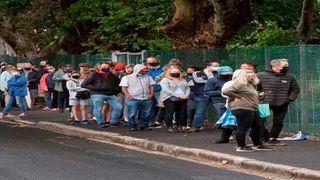
Voters queue to vote at a school being used as a polling station in the middle-class suburb of Claremont, near Cape Town, on November 1, 2021, during South Africa's local elections.
Africa
Premium
Hope to impasse: South Africans find unfulfilled promises at end of rainbow
"Nothing ever changes," says Miriam, 29, "That's why I didn't vote."
Miriam, who lives in the shantytown of Khayelitsha, about 30km east of Cape Town, is a packer in a suburban supermarket.
Like many South Africans, she did not vote in this week's municipal elections.
If they had all voted together, they would have more votes than what the ruling African National Congress (ANC) party received.
Like many of her fellow citizens, Miriam, who is happy just to have a job at all, has many worries - not enough money, long work hours, an expensive commute.
She lives in what is today designated an 'informal settlement', in reality a vast sprawl of shantytown homes cobbled together from sheets of metal, plastic, wood, cardboard and whatever is available.
In Khayelitsha, there are no street lights, except those that feel more like the lights over a prison camp, standing on high poles and casting pools of harsh light in their immediate vicinity, but spaced far apart.
The narrow alleyways and the few potholed formal streets that run through this high-density community of 400,000 people are dark and dangerous, with many muggings and street killings, as well as astoundingly high levels of rape.
Miriam worries for her safety and that of her two young children.
There are many dangerous people where she lives, including gangsters, youths with no hope of a "real job", who have almost by default signed up with one of the gangs operating in zones across not only this suburb but others too in the far-flung dusty settlements once designated for "blacks only" in the era of race-based rule known as apartheid.
It was because of the hope of change from the dark and difficult apartheid years, that droves turned out to wait hours in the sweltering sun in late April 1994 to cast their first ever vote.
The snaking lines of South Africans of all races, voting together and in peace, was a remarkable sight, shown on TVs around the world, as the 'rainbow nation' was born.
Jubilation and a real sense of promise was in the air of the newly free South Africa.
The Mandela years flew by too quickly and then came the dour but stable leadership of Thabo Mbeki, during which South Africa grew, optimism still outstripping pessimism and hope still a symbol associated with this country.
But the subsequent nine baleful years of the wild and chaotic Jacob Zuma era are now baring their bitter fruit on South African streets ravaged not merely by misspending, incompetence and outright corruption – at every level of administration, especially in municipalities, where government meets citizens daily – but also most recently by the impact of the Covid-19 pandemic.
The South African economy and South Africans in general are in trouble – almost everyone knows and feels it, viscerally.
Where there was once hope and optimism there is often despair, or 'hanging on by fingernails', a commonly used description.
Miriam and her co-worker Eunice, who also lives in Khayelitsha and nods vigorously with each point Miriam makes, adding the occasional "yebo" in agreement and for emphasis, worry about a lot of things.
Like petrol prices, jumping to the highest levels in history at midnight, long before the counting in Monday's municipal vote was done.
Miriam, Eunice and millions more like them worry about petrol prices because that means the minibus taxis (matatus) used by some 80 percent of commuters will hike their rates, yet again.
Already, there is not enough money to make it to the end of the month, so how will she cope, Miriam asks, looking with direct and pleading eyes.
The customer at the till - having asked almost in passing of the two ladies, one a teller the other a packer, if they had voted, and met with the raising of arms, rolling of eyeballs and Miriam's remarks about voting being pointless - is silenced by what has been said.
In a nutshell, this brief mundane encounter summarises the 27-year-journey South Africa has taken from its hope and joy-filled birth to its current impasse.
Not all hope is gone, though.
President Cyril Ramaphosa is still the country's most popular political figure by far and in him the ANC's hopes of revival have come to rest.
For the first time in its history as an unbanned political party, the 109-year-old ANC is a minority party, though still in power nationally and in eight of nine provinces.
But in metros like the political capital Tshwane, and many towns across the country, the once dominant ANC is happy simply to have retained some grip on power, even if only in a coalition in many cases.
Miriam doesn't care one way or the other.
"It's a waste of time voting. Why must I spend my time and money doing that when I am just getting someone else into a job where they can steal," she says, shaking her head.
Eunice nods in enthusiastic agreement, with another "yebo" as final emphasis.
The customer moves off, seemingly sobered by what has just transpired.
Could it be that the rainbow nation has found too many empty unfulfilled promises, rather than pots of gold, at the end of that promise in the sky?




